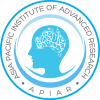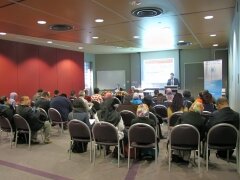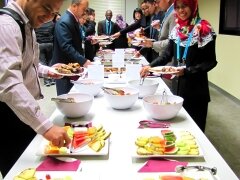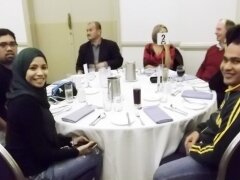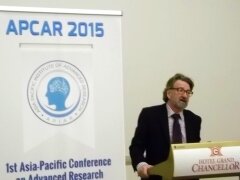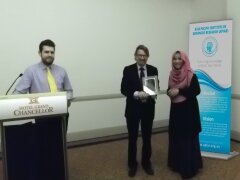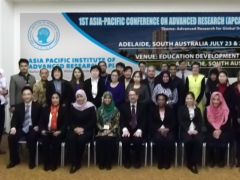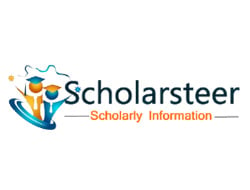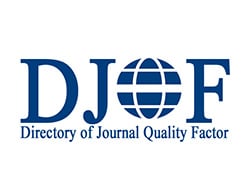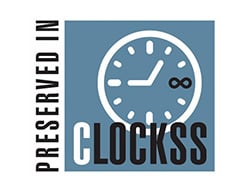1st Asia-Pacific Conference on Advanced Research, Adelaide, South Australia
DATE: 2015-07-23 - 2015-07-24
VENUE: Education Development Centre, Adelaide, South Australia.
CONFERENCE PROCEEDINGS : APCAR 2015
Front matter: APCAR – 2015 (Volume 1)
Conference:
Conference: 1st Asia Pacific Conference on Advanced Research (APCAR-2015)
Chief Editor: Professor Gregory McCarthy
Location: Education Development Centre, Adelaide, Australia.
Date: 23rd and 24th of July, 2015
Sponsor: Asia Pacific Institute of Advanced Research (APIAR)
Publisher:
Asia Pacific Institute of Advanced Research (APIAR)
Suite 1A Level 2; 802 Pacific Highway; Gordon NSW 2072; Australia
Document Information:
Document Type: Proceedings Paper
Language: English
ISBN: 978-0-9943656-6-8
Copyright @ 2015, Asia Pacific Institute of Advanced Research (APIAR).
A SYSTEM DYNAMICS MODEL FOR HORIZONTAL COLLABORATION IN AIR CARGO TRANSPORT SERVICES
Best Paper in Business.
Author details:
- Tommy King-Yin Cheung, Hang Seng Management College, Hong Kong.
- Collin Wai Hung Wong, Hang Seng Management College, Hong Kong.
Page Numbers: 71 - 79
DOWNLOADEXPLORING THE POTENTIAL OF MOBILE PEDAGOGY BY USING IPAD
Best Paper in Education.
Author details:
- Kam Po Wong, Hong Kong Community College, The Hong Kong Polytechnic University, Hong Kong.
Page Numbers: 190 - 195
DOWNLOADBIOLOGICALLY INSPIRED VECTOR FIELDS TO GENERATE HAIR DIRECTIONS
Best Paper in Information Technology.
Author details:
- Siew Mai Bong, Deakin University, Australia.
- Shaun Bangay, Deakin University, Australia.
Page Numbers: 248 - 257
DOWNLOADA MALAY MUSLIM WOMAN’S TRAVEL NARRATIVE
Best Paper in Social Science.
Author details:
- Haslina Binti Omar, Universiti Putra, Malaysia.
Page Numbers: 397 - 401
DOWNLOADHOW SMALL AND MEDIUM ENTERPRISES BECOME SUSTAINABLE IN GLOBAL BUSINESS (STAKEHOLDER APPROACH TO BUSINESS RESPONSIBILITY OF INDONESIAN SME PRACTICES)
Author Details:
- Ginta Ginting, Universitas Terbuka, Indonesia.
Page Numbers: 1 - 13
DOWNLOADTHE IMPACT OF PERCEIVED SERVICE QUALITY ON REPURCHASE: A STUDY OF A DISTANCE EDUCATION INSTITUTION
Author Details:
- Meirani Harsasi, Universitas Terbuka, Indonesia
- Anfas, Universitas Terbuka, Indonesia
Page Numbers: 14 - 21
DOWNLOADPREDICTIVE MODEL OF TOTAL INCOME FROM SALARIES/WAGES IN THE CONTEXT OF PASAY CITY
Author Details:
- Wilson Cordova, Chiang Kai Shek College, Philippines.
Page Numbers: 22 - 29
DOWNLOADEFFECT OF INFORMATION AND COMMUNICATIONS TECHNOLOGY ON TRADE FLOWS USING GRAVITY MODEL
Author Details:
- Farzaneh H. Hassani, Islamic Azad University, Iran.
- Taghi Torabi, Islamic Azad University, Iran.
- Shahriar Gharibzadeh, Amirkabir University of Technology, Iran.
Page Numbers: 30 - 39
DOWNLOADCONSUMER RISK PERCEPTIONS IN RTE (READY-TO-EAT) BREAKFAST CEREAL MARKET
Author details:
- Simi Simon, Al Musanna College of Technology, Sultanate of Oman.
- Dr. B. Murali Manohar B, Vellore Institute of Technology, India.
Page Numbers: 40 - 47
DOWNLOADPARTICIPATION IN TAX E-FILING: CREATING OWNERSHIP SENSE OR REDUCE INDISTINCTNESS IN SYSTEM’S DESIGN?
Author details:
- Saliza Abdul Aziz, Universiti Utara Malaysia, Malaysia.
- Kamil Md Idris, Universiti Utara Malaysia, Malaysia.
Page Numbers: 48 - 53
DOWNLOADREINVIGORATING THE RELIGION OF ENTREPRENEURSHIP: EXAMINING THE INFLUENCE OF ISLAM ON BUSINESS DECISION-MAKING EXPERIENCE OF MICRO ENTREPRENEURS
Author details:
- Hassan, I.S., University Putra , Serdang, Malaysia.
- Salleh, A., University Putra , Serdang, Malaysia.
Page Numbers: 54 - 61
DOWNLOADEffect of Human Capital Inequality and Income Inequality, Estimated by Generalized Method of Moment (GMM)
Author details:
- Suraya Mahmooda, University Malaysia Kelantana.
- Zaleha Mohd Noorb, University Putra Malaysiab.
Page Numbers: 62 - 70
DOWNLOADA SYSTEM DYNAMICS MODEL FOR HORIZONTAL COLLABORATION IN AIR CARGO TRANSPORT SERVICES
Best Paper in Business.
Author details:
- Tommy King-Yin Cheung, Hang Seng Management College, Hong Kong.
- Collin Wai Hung Wong, Hang Seng Management College, Hong Kong.
Page Numbers: 71 - 79
DOWNLOADBOOMERANG RELATIONSHIP PATTERNS IN PROJECT TEAMS
Author details:
- Blanas Georgea, TEI of Thessalya, Greece.
- Kilindri Stamatiab, Institute of Technology and Innovation, Denmark.
Page Numbers: 80 - 87
DOWNLOADTHE FUTURE OF ELECTRIC CARS IN ICELAND: MARKET READINESS AND GROWTH OPPORTUNITIES
Author details:
- Dr. Andri Ottesen, Australian Collage of Kuwait, Misref, Kuwait.
- Tinna Kjartansdottir, University of Bifrost, Bifrost, Iceland.
Page Numbers: 88 - 100
DOWNLOADA STRATEGIC OPEN INNOVATION MODEL: PRODUCTIVITY INPROVEMENT IN SMALL MEDIUM INDUSTRIES/SMIs
Author details:
- Muzamil, Universitas Terbuka, Indonesia
- Ginta Ginting, Universitas Terbuka, Indonesia
Page Numbers: 101 - 110
DOWNLOADPRICING REACTION UNDER AREA INFLATION: NEW INSTITUTIONAL ECONOMICS PERSPECTIVES
Author details:
- Soei MA Yuen Tung, The Hong Kong Polytechnic University, Hong Kong.
Page Numbers: 111 - 111
DOWNLOADFOREIGN PLAYERS IN LOCAL MARKETS: GETTING DEVELOPMENT RIGHT BY FDI ENTERPRISES – AN INSTITUTIONAL ANALYSIS OF HONG KONG REAL ESTATE DEVELOPERS IN CHINA’S URBAN LAND MARKET
Author details:
- CHEN Xingguang, The Hong Kong Polytechnic University, Hong Kong.
Page Numbers: 112 - 112
DOWNLOADDEVELOPING LEADER’S SUPPORTIVE BEHAVIOURS TO IMPROVE THE WELL-BEING OF STAFF/ DIRECT REPORTS: BARRIERS AND ENABLERS – A TRANSFER OF LEARNING APPROACH
Author details:
- Shona Munro, Deakin University, Melbourne.
Page Numbers: 113 - 113
DOWNLOADTHE ROLE OF INTERNAL CORPORATE SOCIAL RESPONSIBILITY IN PROFESSIONAL SERVICE SECTOR: AN EMPIRICAL STUDY FROM KLANG VALLEY, MALAYSIA
Author details:
- Mei Peng Low, Universiti Tunku Abdul Rahman, Malaysia.
- Seng Fook Ong, Universiti Tunku Abdul Rahman, Malaysia.
Page Numbers: 114 - 114
DOWNLOADEXPERT EFL TEACHERS’ SUPPORT FOR CHINESE HIGH SCHOOL STUDENTS’ LEARNING OF WORD MEANINGS THROUGH BLOGS
Author details:
- Duan Jing, University of Malaya, Malaysia.
- Adelina Asmawi, University of Malaya, Malaysia.
Page Numbers: 115 - 138
DOWNLOADTHE ADOPTION OF E-LEARNING TO THE STUDY OF SOCIAL STUDIES AT THE SECONDARY SCHOOL LEVELS IN NIGERIA
Author details:
- Adediran Adekunle Amos, Federal College of Education, Nigeria.
- Fayemi John Adelani, Tai-Solarin University of Education, Nigeria.
- Adebajo, Y. Adebola, Tai-Solarin University of Education, Nigeria.
Page Numbers: 139 - 145
DOWNLOADINSTRUCTIONAL STRATEGIES FOR EFFECTIVE TEACHING AND LEARNING IN NIGERIA SECONDARY SCHOOLS
Author details:
- Adediran Adekunle Amos, Federal College of Education, Nigeria.
- Orukotan Akinyemi Folasayo (Ph.D), Adeniran Ogunsanya College of Education, Nigeria.
- Adeyanju Esther Oluwatoyin, Federal College of Education, Nigeria.
Page Numbers: 146 - 155
DOWNLOADTHE EFFECTS OF SERVICE-LEARNING ON STUDENT OUTCOMES: A CASE STUDY OF UNIVERSITY STUDENTS IN HONG KONG
Author details:
- Steven S.Y. Ngai, The Chinese University of Hong Kong
Page Numbers: 156 - 162
DOWNLOADThe Learning Transfer System Inventory and the Professional Development of New Zealand Physical Education Teachers
Author details:
- Dr.Barrie Gordon, Victoria University of Wellington, New Zealand
Page Numbers: 163 - 167
DOWNLOADRECOGNISING BARRIERS TO ACADEMIC ACHIEVEMENT OF FOSTER CHILDREN IN MALAYSIA: A CASE STUDY
Author details:
- Jariah Mohd Jan, University of Malaya, Malaysia.
- Cherish How, University of Malaya, Malaysia.
Page Numbers: 168 - 174
DOWNLOADVIEWER OF CONTENTS FOR E-LEARNING THROUGH FRAMEWORK OF CONSTRUCTION E-CONTENT
Author details:
- Yesenia Rodríguez Parra, Militar Nueva Granada University, Bogotá D.C Colombia.
- Christian Quintero, Militar Nueva Granada University, Bogotá D.C Colombia.
Page Numbers: 175 - 180
DOWNLOADFACILITATING A MEANINGFUL LEARNING EXPERIENCE FOR STUDENTS BY MULTIMEDIA TEACHING APPROACH
Author details:
- Kam Po Wong, Hong Kong Community College, The Hong Kong Polytechnic University, Hong Kong.
Page Numbers: 181 - 189
DOWNLOADEXPLORING THE POTENTIAL OF MOBILE PEDAGOGY BY USING IPAD
Best Paper in Education.
Author details:
- Kam Po Wong, Hong Kong Community College, The Hong Kong Polytechnic University, Hong Kong.
Page Numbers: 190 - 195
DOWNLOADCREATING INTERACTIVE IBOOK FOR ACADEMIC WRITING AMONG UNDERGRADUATE STUDENTS IN A MALAYSIAN UNIVERSITY
Author details:
- Adelina Asmawi, University of Malaya, Malaysia.
- Mariani Md Nor, University of Malaya, Malaysia.
- Esther Daniel, University of Malaya, Malaysia.
- Farah Diana Farid, University of Malaya, Malaysia.
Page Numbers: 196 - 200
DOWNLOADEFFECTS OF BILINGUALISM – ADVANTAGES AND CHALLENGES FOR BILINGUALS, BILITERATES, MONOLINGUALS
Author details:
- Elaine Ng, The Chinese University of Hong Kong, Hong Kong.
Page Numbers: 211 - 211
DOWNLOADAN EVIDENCE-BASED APPROACH TO INFORM TEACHERS ON HOW BEST TO UTILIZE THEIR TIME IN ENGLISH LESSONS
Author details:
- Richard Kwok-Shing Wong, Hong Kong Institute of Education, Hong Kong.
Page Numbers: 212 - 212
DOWNLOADBAKHTIN’S CARNIVAL: DEVELOPING NARRATIVE FRAMEWORKS IN ANALYSING GLOBAL AND LOCAL TEACHER IDENTITIES
Author details:
- Nadia Mead, Central Queensland University, Australia.
- Teresa Moore, Central Queensland University, Australia.
- Nicole Anae, Central Queensland University, Australia.
Page Numbers: 213 - 213
DOWNLOADTECHNOSTRESS AMONG EDUCATORS: A REVISIT OF SOCIAL COGNITIVE PERSPECTIVE
Author details:
- Khairunnisa Harahap, State University of Medan, Medan, Indonesia.
- Tri Effiyanti, State University of Medan, Medan, Indonesia.
Page Numbers: 214 - 226
DOWNLOADDESIGNING M-COMMERCE APPLICATIONS BASED ON BOTH TECHNICAL VIEWPOINT AND THE END USERS’ PERSPECTIVE
Author details:
- Kam Po Wong, Hong Kong Community College, The Hong Kong Polytechnic University, Hong Kong.
Page Numbers: 227 - 237
DOWNLOADTROUBLE-SHOOTING THE KEY PROBLEMS OF OVERHEAD AND PINBALL-ROUTING IN NESTED MOBILE NETWORK
Author details:
- Kam Po Wong, Hong Kong Community College, The Hong Kong Polytechnic University, Hong Kong.
Page Numbers: 238 - 247
DOWNLOADBIOLOGICALLY INSPIRED VECTOR FIELDS TO GENERATE HAIR DIRECTIONS
Best Paper in Information Technology.
Author details:
- Siew Mai Bong, Deakin University, Australia.
- Shaun Bangay, Deakin University, Australia.
Page Numbers: 248 - 257
DOWNLOADVISUALIZATION AND INTERACTION METHODS FOR PORTABLE ANTIQUITIES OF SINDH
Author details:
- Kulsoom Saima Unar, University of Sindh Jamshoro, Pakistan.
- Dr Zeeshan Patoli, University of South Australia.
- Dr Saleem Chandio, University of Sindh Jamshoro, Pakistan.
- Dr Sarfaraz Solangi, University of Sindh Jamshoro, Pakistan.
Page Numbers: 258 - 265
DOWNLOADA MODEL FOR ADOPTION OF COMMON ALLIANCE PLATFORM IN AIRLINE:INTER-ORGANISATIONAL SYSTEMS AND HOME-REGION ORIENTATION APPROACH USING TOE FRAMEWORK
Author details:
- Don Dong Hyun LEE, Auckland University of Technology, New Zealand.
- William Yu Chung WANG, Auckland University of Technology, New Zealand.
- Paul Tuck Ming LEONG, Auckland University of Technology, New Zealand.
Page Numbers: 266 - 272
DOWNLOADTHE INTERCHANGES OF HEDONIC-UTILITARIAN VALUES TOWARD INFORMATION SYSTEM-USERS SATISFACTION: A CASE OF SOCIAL MEDIA USERS
Author details:
- Andri Zainal, State University of Medan, Medan, Indonesia, University of Malaya, Kuala Lumpur, Malaysia.
- Gaffar Hafiz Sagala, State University of Medan, Medan, Indonesia.
- Rusnah Muhamad, University of Malaya, Kuala Lumpur, Malaysia
Page Numbers: 273 - 284
DOWNLOADINFORMATION TECHNOLOGY SUPPORT STAFF’S COMPETENCY LEVEL IN E-LEARNING IMPLEMENTATION: A COMPARATIVE STUDY OF KENYATTA UNIVERSITY, KENYA AND UNIVERSITY OF CAPE COAST, GHANA
Author details:
- Agnes W. Gathumbi, Keny atta University , Kenya.
- Paul Nyagorme, University of Cape Coast, Ghana.
Page Numbers: 285 - 292
DOWNLOADSIMILAR DOCUMENT DETERMINATION METHOD BY USING COMPOUND NOUNS
Author details:
- Kyoko Yanagihori, University of Tsukuba, Japan.
- Kazuhiko Tsuda, University of Tsukuba, Japan.
Page Numbers: 293 - 299
DOWNLOADMETHODOLOGY FOR UNDERUTILIZED CROPS IN ORDER TO INCREASE RURAL ECONOMIC GROWTH THRU ECONOMIC VALUE CHAIN PREDICTION
Author details:
- Oh Mei Shin, University of Nottingham Malaysia Campus, Malaysia.
- Chen Zhi Yuan, University of Nottingham Malaysia Campus, Malaysia.
- Dino Isa, University of Nottingham Malaysia Campus, Malaysia.
Page Numbers: 300 - 309
DOWNLOADTHE CONTRIBUTIONS OF FISHER’S KNOWLEDGE TO MARINE FISHERIES MANAGEMENT A CASE STUDY OF A COASTAL COMMUNE IN VIETNAM
Author details:
- Nguyen Bach Dang, The University of Newcastle, Australia.
- Salim Momtaz, The University of Newcastle, Australia.
- Kenneth Zimmerman, The University of Newcastle, Australia.
- Pham Thi Hong Nhung, The University of Newcastle, Australia.
Page Numbers: 310 - 320
DOWNLOADNURTURING AND MANAGEMENT OF TALENT IN MOTORSPORT
Author details:
- Syarizal A.R, University Malaysia Kelantan, Kota Bharu Malaysia.
- Mfirdaus M.N, University Malaysia Kelantan, Kota Bharu Malaysia.
- Razli C.R, University Malaysia Kelantan, Kota Bharu Malaysia
Page Numbers: 321 - 331
DOWNLOADWOMEN IN SOUTH AUSTRALIAN PUBLIC SERVICE: FACTORS INFLUENCING CHOICES FOR LEADERSHIP CAREER
Author details:
- Syeda Nuzhat E Ibrat, The University of Adelaide, Adelaide, Australia.
Page Numbers: 332 - 340
DOWNLOADIN THE NAME OF COUNTER-TERRORISM: HUMAN RIGHTS ABUSES IN INDONESIA
Author details:
- Milda Istiqomah SH.MTCP, University of Brawijaya, Malang, Indonesia.
Page Numbers: 341 - 351
DOWNLOADTHE ISLAMIC-BASED DEVELOPMENT INDEX (IBD-I) WORLDVIEW: A CASE OF THE MALAYSIAN SYARIAH INDEX (MSI)
Author details:
- Mohd Shukri Hanapi, Universiti Sains Malaysia, Malaysia.
Page Numbers: 352 - 363
DOWNLOADREVITALIZING THE INDIGENOUS SEMAI ORANG ASLI LANGUAGE IN MALAYSIA
Author details:
- Dr Alias Abd Ghani, Universiti Sains Malaysia, Malaysia.
Page Numbers: 364 - 369
DOWNLOADGOAL SCORING CHARATERISTICS IN SOCCER: ARE THEY TECHNIQUE AND TIME DEPENDENT?
Author details:
- Mohd Firdaus Mahamad Ali, Universiti Malaysia Kelantan, Malaysia.
- Athanasios Katis, Aristotle University of Thessaloniki, Greece.
- Glykeria Patsika, Aristotle University of Thessaloniki, Greece.
- Eleftherios Kellis, Aristotle University of Thessaloniki, Greece
Page Numbers: 370 - 378
DOWNLOADQUESTIONS IN PARLIAMENTARY DISCOURSE DURING DIFFERENT RULING PERIODS IN TAIWAN: A NEO-POLITENESS-THEORETICAL ANALYSIS
Author details:
- Bin-Bin Yu , Lunghwa University of Science and Technology, Taiwan.
Page Numbers: 379 - 384
DOWNLOADMOTIVATED STRATEGIES FOR LEARNING AND COGNITIVE STYLES AMONG A SAMPLE OF UAE HIGH SCHOOL STUDENTS
Author details:
- Prof .Abdalla F. El-mneizel, University Of Sharjah.
- Prof. Adnan Y. Atoum, Yarmouk University.
Page Numbers: 385 - 396
DOWNLOADA MALAY MUSLIM WOMAN’S TRAVEL NARRATIVE
Best Paper in Social Science.
Author details:
- Haslina Binti Omar, Universiti Putra, Malaysia.
Page Numbers: 397 - 401
DOWNLOADESTABLISHING COMMUNICATION AND HEALTHY CHILD EDUCATION
Author details:
- I Gusti Agung Alit Suryawati, Udayana University.
Page Numbers: 402 - 406
DOWNLOADTHE CHANGING OF TRADITIONAL COMMUNICATION MEDIUM TO SOCIAL MEDIA IN BALI
Author details:
- Dr Ni Made Ras Amanda Gelgel, Udayana University Denpasar, Indonesia.
Page Numbers: 407 - 411
DOWNLOADFACTORS AFFECTING THE CONFLICT BETWEEN FISHING COMMUNITY AND AGRICULTURAL COMMUNITY: A CASE STUDY OF TAM GIANG LAGOON IN THE CENTRAL OF VIETNAM.
Author details:
- Pham Thi Hong Nhung, The University of Newcastle, Australia.
- Salim Momtaz, The University of Newcastle, Australia.
- Kenneth Zimmerman, The University of Newcastle, Australia.
- Nguyen Bach Dang, The University of Newcastle, Australia
Page Numbers: 412 - 421
DOWNLOADPERCEPTION OF LOCAL YOUTH IN SABAH TOWARDS CAREER IN OIL PALM PLANTATION
Author details:
- Mohammad Amizi A., University Malaysia Kelantan, Malaysia.
- Norehan Abdullah, Universiti Utara Malaysia.
- Jamal Ali, Universiti Utara Malaysia.
- Roslina Kamaruddin, Universiti Utara Malaysia.
Page Numbers: 422 - 429
DOWNLOADTRENDS OF SOCIAL WORK RESEARCH IN KINGDOM OF SAUDI ARABIA
Author details:
- Dr. Khalil abdelmaksoud A Ibrahim, Umm Al-qura Saud University, Saudi Arabia.
- DR.Hind A.M.Almazair, Faculty of arts-Saud University, Saudi Arabia.
Page Numbers: 430 - 430
DOWNLOADAPCAR 2015 Info
The 1st Asia Pacific Conference on Advanced Research (APCAR-2015) will be held on 23rd and 24th of July 2015 in Adelaide, South Australia. The main theme of this conference is ‘Advanced Research for Global Development’. Accordingly, the conference will cover Business, Social Sciences, Education and Information and Communications Technology (ICT) disciplines. Internationally-recognized scholars will participate in the event to present their latest research and best practices.
We, the conference organisers invite you to participate in this event where you can:
- Strengthen your professional ties: this may lead to publications and job opportunities – an invaluable opportunity for post-PhD professionals.
- Receive feedback and constructive critique on your ideas: benefit from the audience engaging with your content rather than focusing on your punctuation and references.
- Refine your communication skills: move from your “isolating” research experience to a more collaborative and exchange of perspectives.
- Participate in our conference and publish your research directly through the conference proceedings and journals. Don’t miss this great opportunity to get your work out there!
Our conferences are multidisciplinary and focus on different subject areas. Over the past few years an average of forty to fifty participants have participated in each event. Great interaction and professional networking took place on every occasion. You can take advantage of these benefits by participating in a conference that will assist you to enhance your research career.
All accepted papers will be peer reviewed and published in the conference proceeding to promote the prominent (and emerging) voices within your field of research.
Special Attractions:
All of the accepted papers will be published without any extra fees in the following journals:
Asia Pacific Journal of Advanced Business and Social Studies (APJABSS)
Asia Pacific Journal of Contemporary Education and Communication Technology (APJCECT)
All of the paper presenters will receive a 25 per cent discount when presenting their papers at our second conference, which will be held in Melbourne, Australia on 8–9 February 2016. Meanwhile, we are looking forward to seeing you in Adelaide in July 2015.
Conference Committee

Prof. Peter Curson

Prof. Kubais S. Abdulfattah Fahady

Prof. Dennis Rumley

Prof. Maurice Galton

Asst. Prof. Hongjin Zhu

Assoc. Prof. Nourah Alyousef

Professor Ghassan Omet

Professor Robert Wright

Assistant Professor Ahmed Ali Khalifa

Professor Martin Mills

Professor Djamel Eddine Laouisset

Professor Robyn Gillies

Associate Professor Pawel Bilinksi,

Associate Professor Blaine Hatt

Assistant Professor Ali Alkhalifah

Associate Professor Jehad Aldehayyat

Associate Professor Peter Kriesler

Professor Elizabeth Fernandez

Mohamed Saeed Hasab El Naby
Call for Paper
The first Asia-Pacific Conference on Advanced Research (APCAR 2015) will be the premier forum for the presentation of new advances and research results in the fields of theoretical, experimental and applied Business, Social Sciences, Information and Communication Technology, and Education. The conference will bring together leading researchers, academics, consultants, scholars, practitioners and research students from their respective domains of interest around the world. Our distinguished participants will have the opportunity to present their valuable research contributions and to establish an international network among those who volunteer to communicate and study together in the fields of knowledge mentioned above. The conference committee strongly encourages postgraduate research students to present their research proposals, literature reviews or findings at this event with a very special registration fees. Other interested parties and delegations from these fields are also free to attend this event.
All submissions will be peer reviewed and evaluated, based on originality, technical and/or research content/depth, accuracy, relevance to the conference and readability. Submissions will be chosen based on technical merit, interest, applicability, and how well they fit into a coherent and balanced technical program.
Topics of interest for submission include, but are not limited to:
Business: Accounting, Strategic Finance, Macroeconomics, Microeconomics, Strategic Management, Strategic Marketing, Leadership, Entrepreneurship, Human Resource Management, Human Resource Development, Performance Management, Recruitment and Selection, Logistics and Supply Chain Management, International Business, Globalisation, Corporate Social Responsibility, E-business/E-commerce, Integrated Marketing Communication and Relationship Marketing.
Social Sciences:
Anthropology, Archaeology, Area Studies, Cultural and Ethnic Studies, Communication Studies, Gender and Sexuality studies, Geography, History, Law, Linguistics, Political Science, Psychology, Sociology, International Relations, Development Studies, Population Studies, Journalism and Mass Communication, Corporate Governance, Cross-Cultural Studies, Peace and Conflict Studies, Public Administration, Philosophy, Women’s Studies, Religious Studies and Social Welfare Studies.
Education:
Theory of Education, Assertive and Assistive Educational Technology, Comparative Education, Counselling, Cultural Literacy, Curriculum Studies, Distance Education, Early Education, Educational Change, Educational Policy, Planning and Practice, Educational Psychology, Education and Public Policy, Educational Research and Statistics, E-learning, Health Education, Tertiary Education, Innovative Education, Information & Library Science, International Exchange Programs, Language Education, Liberal Education, Mathematics Education, Medical Education, Physical Education, Science Education, Secondary Education, Special Education and Technology Education.
Information and Communication Technology:
Advanced IT Bio/Medical Engineering, Bioinformatics and applications, Business and Information Systems, Cloud computing, Convergence in Information Technology Security, Data Mining and Knowledge Discovery, Digital convergence, Electronic Commerce, Business and Management, Grid and Cloud Computing, Intelligent Robotics and Autonomous Agents, Hardware and Software Design, Health and Medical Informatics, Hybrid information technology, Intelligent communications and networks, IT-based Convergence Technology and Service, Multimedia convergence, Smart Card and RFID Technologies, Soft Computing and Intelligent Systems, Social and Business Aspects of Convergence IT, Ubiquitous Computing and Embedded Systems, Recent Trends in Computing & Information technology.
All papers accepted in the APCAR 2015 will be published in the following journals without any additional fees:
Asia Pacific Journal of Advanced Business and Social Studies (APJABSS)
Asia Pacific Journal of Contemporary Education and Communication Technology (APJCECT)
No manuscript will be accepted without the required format. All manuscripts should be professionally proofread before submission.
Author Guidelines
Papers should be original contributions and should not be under consideration for any other conference or publication at the same time. Full papers must contain the title of the paper, name(s) and affiliation(s) of the author(s), abstract (200–250 words) and keywords (3–5 keywords, organised alphabetically). The main text of the paper must include the introduction, research problem, review of the relevant literature, methods, data analysis and conclusion. The full paper should be a minimum of 4 pages and maximum of 8 pages in length.
The reviewers or the review committee may sometimes request access to data and calculations during the review process. Authors must be willing to supply these if requested. Papers must be in MS Word file format and submitted electronically to the conference chair.
Authors are fully responsible for obtaining permissions and clearing any copyright issues relating to the content of their submissions. Each submission will be reviewed by two anonymous reviewers with sufficient expertise in the relevant field.
For each accepted paper, at least one author must register for the conference as a presenter. The duly registered presenter(s) shall be allowed to present the accepted paper(s) at the conference and shall be included in the conference proceedings published by Asia Pacific Institute of Advanced Research (APIAR). Only the registered presenter(s) can present papers and no substitutes will be allowed. Registered presenters shall receive a copy of the conference proceedings at the conference.
Please click on the following link to download the Full Paper Template.
Important Dates
|
Events |
Dates |
|
Abstract / Full Paper submission opens |
23 December 2014 |
|
Abstract / Full paper submission deadline |
30 March 2015 |
|
Acceptance notification |
30 April 2015 |
|
Early bird registration deadline |
02 May 2015 |
|
Regular registration deadline |
02 Jun 2015 |
|
Conference dates |
23–24 July 2015 |
The organising committee of APCAR, 2015 kindly requests all the authors of the accepted papers to register latest by the regular registration deadline, otherwise the accepted papers may not be included in the conference proceedings for APCAR, 2015.
Best Paper Awards
APIAR recognises outstanding contributions to research. There are four Best Papers awards for four streams. Best Papers are judged both on the merits of the written document and on the quality of their presentation at the conference. The awards serve to acknowledge the authors who receive them as leading researchers in Business, Education, ICT and Social Sciences. The awards also provide an incentive to authors to produce high-quality papers and present them in a lucid and compelling manner.
APIAR Best Paper Award recipients are selected through a two-prong process. The first step is a review of the full-length papers accepted for the conference. Review committee members of the conference rank these papers according to quality, relevance and originality, to determine the finalists for each award category. While selection as a finalist for an APIAR Best Paper Award is a notable achievement in itself, winners are then chosen from the finalists, according to the quality of their presentations. Presentation quality is judged according to the audience feedback collected at the conference.
About Adelaide
Adelaide offers all the advantages of a cosmopolitan city without the problems of a very big city. The Mediterranean climate, ease of access, affordable entertainment, high-quality accommodation and excellent shopping, are among the attractions that made conference delegates name Adelaide as "the perfect conference city".
After arriving at the new international airport, delegates can check into their hotel within half an hour, and have the benefit of being situated opposite the world-class convention centre. What is more, the hotel is just a stone’s throw away from our pristine beaches and world-renowned wineries.
Adelaide presents the perfect opportunity for relaxation and enjoyment. Here, you can discover the local gourmet cuisine and famed regional wines as well as enjoying a range of social events and adventure trips. The unique wildlife parks, clean and beautiful beaches, the vibrant cafés, great dining, the riverboats and dolphin cruises all make Adelaide an excellent holiday destination for all ages.
The city provides the ideal opportunity to pursue your professional development and, at the same time, to enjoy everything the city has to offer at APCAR-2015.
Climate
Adelaide enjoys a predictable ‘Mediterranean style’ climate with warm, dry summers and mild winters punctuated with occasional rain. It is Australia’s driest capital city with only a few millimetres of rain falling in Adelaide during summer.
For the month of July, The temperature remains in between 15°C to 28°C.
Getting to Adelaide
Plane
Adelaide Airport is one of Australia’s most modern passenger facilities and is serviced by seven international and four domestic carriers, with regular direct flights to and from all major Australian cities. Adelaide Airport is approximately 20 minutes by taxi to the Adelaide Convention Centre. The Skylink Airport Shuttle specialises in providing a regular scheduled bus service between Adelaide Airport, Keswick Interstate Railway Terminal and the Adelaide CBD. There are set-downs and pick-ups from most major city hotels. The shuttle service operates every day of the year, except Christmas Day. For more information please call +61 8 8332 0528 or visit the website: www.skylinkadelaide.com
Train
Keswick Railway Terminal is approximately three kilometres from Adelaide’s city centre, and is serviced by the Overland to Melbourne four times per week, the Indian Pacific between Perth and Sydney twice a week and the Ghan, which runs from Adelaide to Alice Springs and Darwin.
Road
South Australia has a good network of public roads and highways to navigate if you are driving to Adelaide. National highways leading to Adelaide include the Sturt Highway (A20), Dukes Highway (A8), and Eyre Highway (A1).
Coach
Several coach carriers service the Adelaide Central Bus Station, located in Franklin Street, Adelaide, from other Australian capital cities and regional centres. Carriers include Greyhound, Premier Stateliner and Vline.
Inner City Dining
City food is concentrated around Gouger Street and Rundle Street. You’ll love the relaxed atmosphere and international menus. In other parts of the city centre, try The Greek on Halifax (street), Goodlife Pizza restaurants on Hutt Street, O’Connell Street and at Glenelg or Cos on Leigh Street.
If you still can’t decide, 5 or 10 minutes in a cab will have you on King William Road at Hyde Park, Unley Road, The Parade at Norwood, Melbourne or O’Connell Streets, both in North Adelaide.
Wherever you go though, there’s a huge choice, with everything from ever popular family owned cafés and restaurants, to well known franchise businesses.
For more information and suggestions for dining out in Adelaide see www.yourrestaurants.com.au/sa/adelaide/
Stay
There are over 4,500 hotel rooms in very close proximity to the Adelaide city centre, while delegates who choose to stay further out (e.g., on the beachfront) can access a range of modern transport options, including trams, buses and taxis.
Sponsorship
Asia-Pacific Institute of Advanced Research (APIAR) always welcomes any kind of sponsorship. APIAR believes that it is a great opportunity for sponsors to enhance their visibility and to reach academics, researchers, consultants and members of the business community from around the world. In our first conference ‘Asia-Pacific Conference on Advanced Research (APCAR-2015)’ we are expecting delegates from around ten countries. APIAR strongly encourages potential sponsors to participate in APCAR-2015 for the excellent exposure their organisations will receive. The number of contributions necessary to become a sponsor is negotiable.
APIAR offers three different types of sponsoring opportunities as follows:
GOLD Sponsorship
Special Session in Program:
- A 15-minute special session in front of the full audience to explain your organisation’s unique characteristics.
Branding:
- The logo of your organisation will be displayed on all APCAR 2015 websites, newsletters, on the CD of Proceedings and on signage at the venue.
Press Release:
- A press release, announcing your participation, will be sent to all APCAR 2015 media and analyst contacts.
E-Newsletters:
- Presentations will be featured in multiple e-Newsletters distributed to the APIAR Community.
Conference Dinner and Crest:
- Every table will have table signage displaying your organisation’s name. You will also receive a crest from the conference chair.
SILVER Sponsorship
Special Session in Program:
- A 10-minute Technical Partnership presentation focused on corporate technical interests.
Branding:
- The logo of your organisation will be displayed on all APCAR 2015 websites, newsletters, on the CD of Proceedings and on signage at the venue.
Press Release:
- A press release, announcing your participation, will be sent to all APCAR 2015 media and analyst contacts.
Crest:
- You will receive a crest from the conference chair.
BRONZE Sponsorship
Branding:
- The logo of your organisation will be displayed on all APCAR 2015 websites, newsletters, on the CD of Proceedings and on signage at the venue.
Press Release:
- A press release, announcing your participation, will be sent to all APCAR 2015 media and analyst contacts.
E-newsletters:
- Presentations will be featured in multiple e-Newsletters distributed to the APIAR Community.
Certificate:
- You will receive a certificate from the conference chair.
Kindly send your sponsorship proposal to [email protected].
Paper Publications
All of the accepted papers (conditions apply) may be published, without any extra fees, in the following journals:
Asia Pacific Journal of Advanced Business and Social Studies (APJABSS)
Asia Pacific Journal of Contemporary Education and Communication Technology (APJCECT)
Publication Ethics & Malpractice Statement
A Publication Ethics and Publication Malpractice Statement
(Composed using the Publishing Ethics Resource Kit and in compliance with Elsevier recommendations.)
Ethical Guidelines for Conference Publication
(These guidelines are based on existing Elsevier policies.)
The publication of an abstract or a full paper in a peer-reviewed conference proceeding is an essential building block in the development of a coherent and respected network of knowledge. It is a direct reflection of the quality of the work of the authors and the institutions that support them. Peer-reviewed abstracts and articles support and embody the scientific research methods. It is therefore important to agree upon standards of expected ethical behaviour for all parties involved in the act of publishing: the author, the editor, the peer reviewers, the publisher and the society.
As publisher, Asia Pacific Institute of Advanced Research (APIAR) takes its duties of guardianship over all stages of publishing extremely seriously and we recognise our ethical and other responsibilities.
We are committed to ensuring that advertising, reprint or other sources of commercial revenue have no impact or influence on editorial decisions. In addition, the APIAR and Editorial Board will assist in communications with other publishers where this is useful and necessary.
Duties of authors
(These guidelines are based on existing Elsevier policies.)
Reporting standards
Authors of reports of original research should present an accurate account of the work performed as well as an objective discussion of its significance. Underlying data should be represented accurately in the paper. A paper should contain sufficient detail and references to permit others to replicate the work.
Fraudulent or knowingly inaccurate statements constitute unethical behaviour and are unacceptable.
Review and professional publication of abstracts and articles should also be accurate and objective, and editorial opinion works should be clearly identified as such.
Data access and retention
Authors may be asked to provide the raw data in connection with a paper for editorial review, and should be prepared to provide public access to such data, if practicable, and should in any event be prepared to retain such data for a reasonable time after publication.
Originality and plagiarism
The authors should ensure that they have written entirely original works, and if the authors have used the work and/or words of others, that this has been appropriately cited or quoted. Plagiarism takes many forms, from passing off another paper as the author’s own paper, to copying or paraphrasing substantial parts of another paper (without attribution), to claiming results from research conducted by others. Plagiarism in all its forms constitutes unethical publishing behaviour and is unacceptable.
Multiple, redundant or concurrent publication
An author should not, in general, publish manuscripts describing essentially the same research in more than one conference proceedings or primary publication. Submitting the same manuscript to more than one conference concurrently constitutes unethical publishing behaviour and is unacceptable. In general, an author should not submit for consideration in another conference a previously published paper. Publication of some kinds of articles in more than one conference proceedings is sometimes justifiable, provided certain conditions are met. The authors and editors of the conference proceedings concerned must agree to the secondary publication, which must reflect the same data and interpretation of the primary document. The primary reference must be cited in the secondary publication.
Acknowledgement of sources
Proper acknowledgment of the work of others must always be given. Authors should cite publications that have been influential in determining the nature of the reported work. Information obtained privately, as in conversation, correspondence or discussion with third parties, must not be used or reported without explicit, written permission from the source. Information obtained in the course of confidential services, such as refereeing manuscripts or grant applications, must not be used without the explicit written permission of the author of the work involved in these services.
Authorship of the paper
Authorship should be limited to those who have made a significant contribution to the conception, design, execution or interpretation of the reported study. All those who have made significant contributions should be listed as co-authors. Where there are others who have participated in certain substantive aspects of the research project, they should be acknowledged or listed as contributors. The corresponding author should ensure that all appropriate co-authors and no inappropriate co-authors are included on the paper, and that all co-authors have seen and approved the final version of the paper and have agreed to its submission for publication.
Hazards and human or animal subjects
If the work involves chemicals, procedures or equipment that have any unusual hazards inherent in their use, the author must clearly identify these in the manuscript. If the work involves the use of animal or human subjects, the author should ensure that the manuscript contains a statement that all procedures were performed in compliance with relevant laws and institutional guidelines and that the appropriate institutional committee(s) has approved them. Authors should include a statement in the manuscript that informed consent was obtained for experimentation with human subjects. The privacy rights of human subjects must always be observed.
Disclosure and conflicts of interest
All authors should disclose in their manuscript any financial or other substantive conflict of interest that might be construed to influence the results or interpretation of their manuscript. All sources of financial support for the project should be disclosed. Examples of potential conflicts of interest which should be disclosed include employment, consultancies, stock ownership, honoraria, paid expert testimony, patent applications/registrations and grants or other funding. Potential conflicts of interest should be disclosed at the earliest stage possible.
Fundamental errors in published works
When an author discovers a significant error or inaccuracy in his/her own published work, it is the author’s obligation to promptly notify the publisher (i.e. APIAR) and cooperate with the editor to retract or correct the paper. If the editor or the publisher learns from a third party that a published work contains a significant error, it is the obligation of the author to promptly retract or correct the paper or provide evidence to the editor of the correctness of the original paper. The publisher (i.e. APIAR) can ask for an additional service charge if the errors were made by the author(s).
Duties of the Editorial Board
(These guidelines are based on existing Elsevier policies and COPE's Best Practice Guidelines for the editors of the conference proceedings.)
Publication decisions
The conference committee is responsible for deciding which of the abstracts / articles should be published. The validation of the work in question and its importance to researchers and readers must always drive such decisions. The editor may be guided by the policies of the editorial board and it is important to note that copyright infringement and plagiarism related issues will be the sole responsibility of the author(s) of any article(s). The editor may confer with other editors or reviewers in making this decision.
Fair play
An editor should evaluate manuscripts for their intellectual content without regard to race, gender, sexual orientation, religious belief, ethnic origin, citizenship or political philosophy of the authors.
Confidentiality
The editor and any editorial staff must not disclose any information about a submitted manuscript to anyone other than the corresponding author, reviewers, potential reviewers, other editorial advisers and the publisher, as appropriate.
Disclosure and conflicts of interest
Unpublished materials disclosed in a submitted manuscript must not be used in an editor's own research without the express written consent of the author. Privileged information or ideas obtained through peer review must be kept confidential and not used for personal advantage. Editors should recuse themselves (i.e. should ask a co-editor, associate editor or other member of the editorial board instead to review and consider) from considering manuscripts in which they have conflicts of interest resulting from competitive, collaborative, or other relationships or connections with any of the authors, companies or (possibly) institutions connected to the papers. Editors should require all contributors to disclose relevant competing interests and publish corrections if competing interests are revealed after publication. If needed, other appropriate action should be taken, such as the publication of a retraction or expression of concern.
Involvement and cooperation in investigations
An editor should take reasonably responsive measures when ethical complaints have been presented concerning a submitted manuscript or published paper, in conjunction with the publisher (or society). Such measures will generally include contacting the author of the manuscript or paper and giving due consideration to the respective complaint or claims made, but may also include further communications to the relevant institutions and research bodies. If the complaint is upheld, the publication of a correction, retraction, expression of concern or other note may be necessary. Every reported act of unethical publishing behaviour must be looked into, even if it is discovered years after publication.
Duties of reviewers
(These guidelines are based on existing Elsevier policies and COPE's Best Practice Guidelines for the conference proceedings editors.)
Contribution to editorial decisions
Peer review assists the editor in making editorial decisions and, through the editorial communications with the author, may also assist the author in improving the paper. Peer review is an essential component of formal scholarly communication, and lies at the heart of the scientific method. Elsevier shares the view of many that all scholars who wish to contribute to publications have an obligation to do a fair share of reviewing.
Promptness
Any selected referee who feels unqualified to review the research reported in a manuscript or knows that its prompt review will be impossible should notify the editor and excuse himself or herself from the review process.
Confidentiality
Any manuscripts received for review must be treated as confidential documents. They must not be shown to or discussed with others except as authorised by the editor.
Standards of objectivity
Reviews should be conducted objectively. Personal criticism of the author is inappropriate. Referees should express their views clearly with supporting arguments.
Acknowledgement of sources
Reviewers should identify relevant published work that has not been cited by the authors. Any statement that an observation, derivation or argument had been previously reported should be accompanied by the relevant citation. A reviewer should also call to the editor's attention any substantial similarity or overlap between the manuscript under consideration and any other published paper of which they have personal knowledge.
Disclosure and conflict of interest
Unpublished materials disclosed in a submitted manuscript must not be used in a reviewer’s own research without the express written consent of the author. Privileged information or ideas obtained through peer review must be kept confidential and not used for personal advantage. Reviewers should not consider manuscripts in which they have conflicts of interest resulting from competitive, collaborative, or other relationships or connections with any of the authors, companies or institutions connected to the papers.
Important Information
Conference Structure
Our conferences are multidisciplinary and focus on different subject areas. Over the past few years an average of forty to fifty participants have participated in each event. Great interaction and professional networking took place on every occasion. You can take advantage of these benefits by participating in a conference that will assist you to enhance your research career.
Privacy Statement
The primary purpose of collecting the personal information requested on this form is to process your registration. In registering for this event, relevant details may be incorporated into a delegate list for the benefit of all delegates (name, email and organisation only) and may be made available to parties directly related to this event.
Insurance
Registration fees DO NOT include insurance of any kind. It is strongly recommended that all delegates arrange their own travel and medical insurance prior to attending the event. The insurance policy should include loss of airfares for any reason; medical expenses; loss or damage to personal property; and any additional expenses and repatriation, should travel arrangements alter. APIAR does not take responsibility for any delegates failing to insure themselves.
Likewise, APIAR does not accept responsibility for personal accidents, theft and/or damage to the property of delegates.
Registration Fee
To register yourself in conference, you need to pay the conference fee. The registration fee is due in advance to participate in the conference (APCAR-2015). Once we received payment authorization then you will receive an e-mail confirming your registration.
Participants must register and attend the conference in order to present their accepted papers. Non-presenting co-author who wants to attend the conference should register as attending only participant.
It is not possible to pay the registration fee after the conference. Conference sessions and other conference events are open only to registered participants.
To assure your participation in the conference and inclusion of your paper in the conference proceedings, your registration fee must be paid before the deadline. If your registration will be late, or if you have difficulties making the payments, please contact our office or send us an e-mail at [email protected] to make suitable arrangements.
Registration Includes
- Admission to the conference.
- Welcome reception, daily refreshment/coffee/snack breaks.
- Attendance at all conference activities.
- Present your accepted paper at the conference.
- Printed copy of the conference program.
- Publication of the paper in online conference proceedings.
- Peer reviewing of one paper to be published in special edition of reputed international journal.
- Certificate for every presenter
- Conference dinner.
Registration Fee:
| Details | Early Bird Payment | Regular Payment |
|---|---|---|
| Student* | AUD $450 | AUD $500 |
| Academic | AUD $500 | AUD $550 |
| Industry Professional | AUD $500 | AUD $550 |
| Co-Author | AUD $350 | AUD $400 |
| Publication Only | AUD $300 | AUD $350 |
| Participation Only | AUD $350 | AUD $400 |
* Needs to provide proof of full-time student status.
* Co-Author's payment is applicable only when the first author has registered.
* Management can cancel any registration without providing any reason. In this case full registration fee will be refunded.
